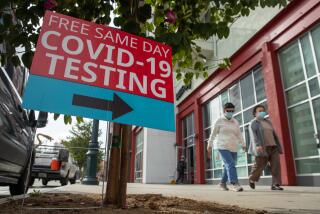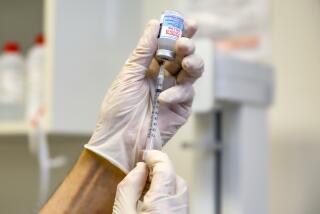Swine flu vaccine on track for September, WHO says
- Share via
Manufacturers are on track to deliver the first doses of a vaccine for pandemic H1N1 influenza in September, World Health Organization officials said Thursday.
The first batches will be limited, but larger deliveries are expected in October, Dr. Marie-Paule Kieny, director of the organization’s Initiative for Vaccine Research said at a news conference in Geneva.
Kieny also noted that yields of antigen, the crucial component in vaccine production, are bigger than companies had initially expected, approaching the yields normally seen for seasonal flu vaccines.
“I don’t want to say too early that the question has been resolved, but it really seems like we have found a way to go around this problem,” she said.
Several companies announced this week that they have begun human trials of the new vaccine against H1N1, commonly known as swine flu. Complete results will not be available from those trials until the end of this year or early next year. But researchers will be looking for any unusual reactions to the vaccine or other complications. If none is seen, the U.S. Food and Drug Administration and health authorities in other countries are likely to approve the vaccines before the completion of clinical trials on the assumption that the new vaccine is basically the same as that for seasonal flu, just using a different strain of virus.
Kieny said the World Health Organization would work closely with member countries to monitor for severe side effects, such as Guillain-Barre syndrome, a temporary paralysis disorder that disabled hundreds of Americans and killed about 30 in the 1976 effort to control a different form of swine flu. Most researchers now believe that side effect was caused by contaminants in the vaccine, although others maintain there was no connection to the vaccine at all.
Kieny noted that vaccine-manufacturing techniques have improved substantially since then.
The key question that researchers are trying to resolve in the clinical trials is how many doses of the new vaccine will be required to provide sufficient protection against the virus.
Preliminary studies have suggested that the antigen being used does not provoke as strong a response as that in the seasonal flu vaccine, and that it may be necessary to use two doses -- which would halve the number of people who could be immunized. Some manufacturers in Europe are attempting to get around this problem by using vaccines with adjuvants, chemicals that stimulate the body’s immune system to react more strongly to the antigens in a vaccine. No flu vaccines containing an adjuvant have ever been approved in the United States.
Also Thursday, new research by the Centers for Disease Control and Prevention found that rapid tests used to diagnose H1N1 flu infection in a doctor’s office are, in general, accurate no more than half the time. If the test comes back positive, you most likely have the virus, but if the test is negative, the results are probably meaningless, the researchers reported in the agency’s Morbidity and Mortality Weekly Report.
The researchers are not talking about the sophisticated laboratory tests used by CDC and other public health authorities to detect the swine flu virus. Those tests look for genetic material from the virus and are considered highly accurate. Rather, the researchers assessed rapid tests used in a doctor’s office. Those are more like home pregnancy tests, using an antibody against the virus to provide a quick visual indication of its presence.
Health authorities fear that the negative tests will prevent physicians from treating patients with antiviral drugs, particularly the patients at high risk, such as pregnant women and those with asthma or other underlying medical conditions.
--






